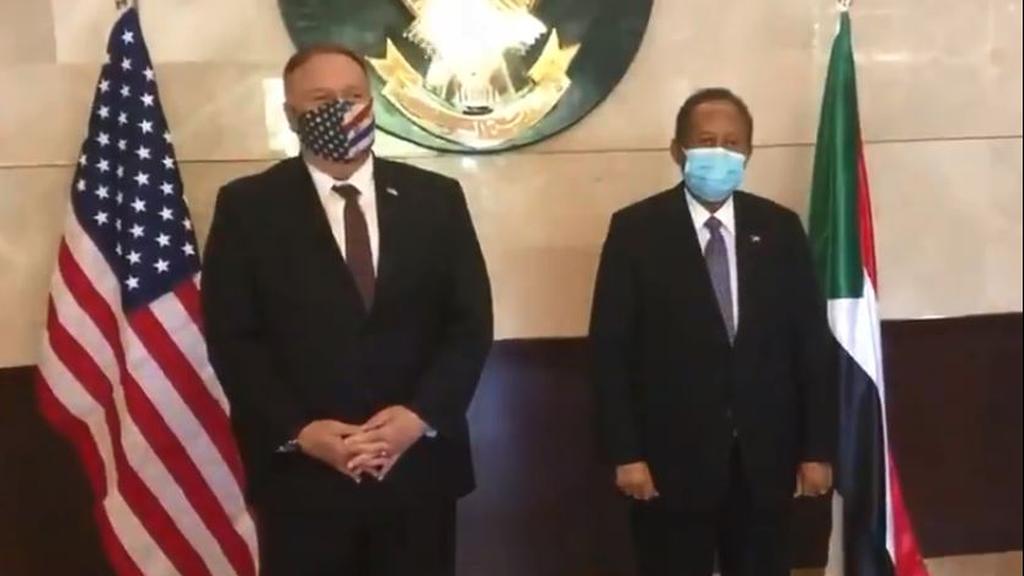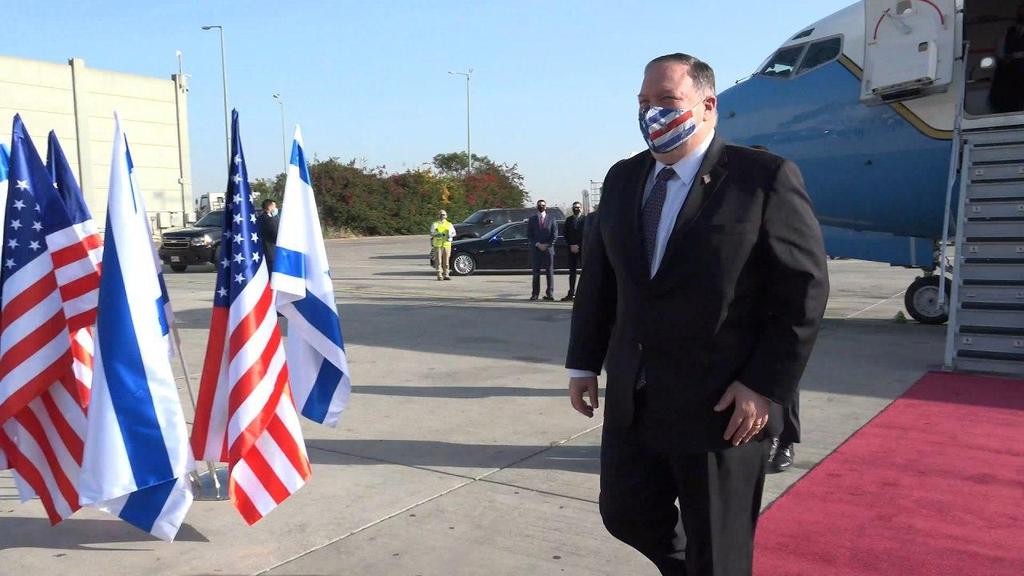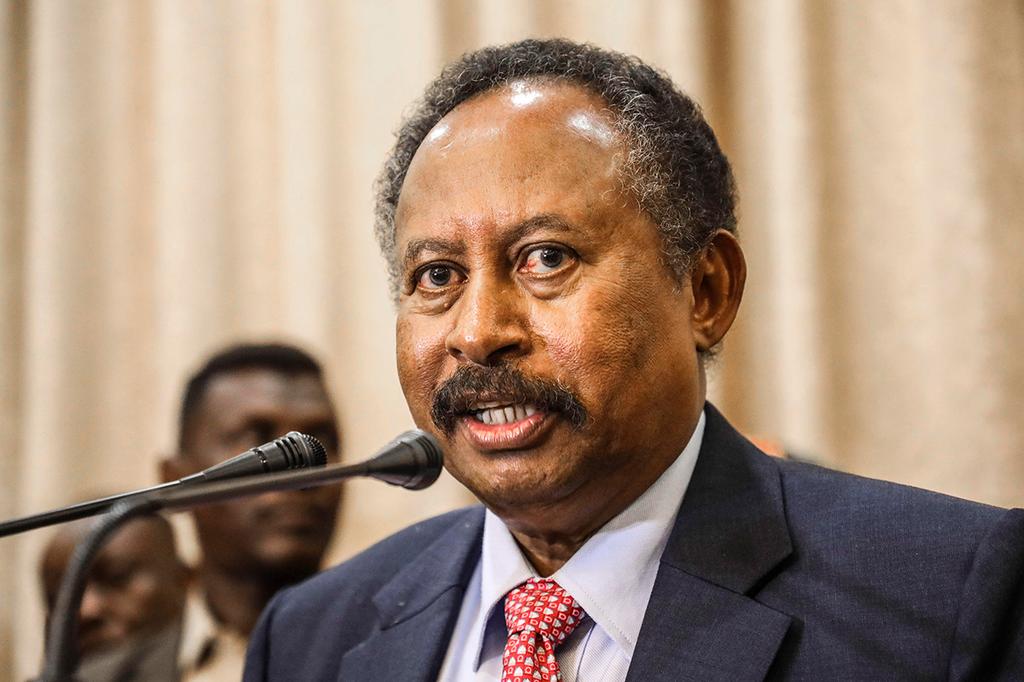Getting your Trinity Audio player ready...
U.S. Secretary of State Mike Pompeo met Tuesday with Sudanese officials in Khartoum, arriving on the first official non-stop flight from Israel as he continued on his push to promote the White House plan for Mideast peace.
Pompeo's mission comes on the heels of an accord between Israel and the United Arab Emirates earlier this month to forge full relations, which the U.S. hopes will encourage more Arab countries to follow suit.
3 View gallery


U.S. Secretary of State Mike Pompeo and Sudanese Prime Minister Abdalla Hamdok meeting in Khartoum on August 25, 2020
(Photo: Screenshot)
"Happy to announce that we are on the FIRST official NONSTOP flight from Israel to Sudan!" Pompeo said on Twitter.
The top American diplomat emerged from the plane after landing at the Khartoum International Airport wearing a face mask as a protective measure against the coronavirus.
His motorcade then left the airport, heading to meetings with Sudanese Gen. Abdel-Fattah Burhan, the head of the ruling sovereign council, and Prime Minister Abdalla Hamdok.
The State Department had said ahead of the tour that Pompeo would discuss "continued U.S. support for the civilian-led transitional government and express support for deepening the Sudan-Israel relationship."
Writing on Twitter after his meeting with Pompeo, Hamdock praised their "direct & transparent conversation" but made no mention of Israel.
Sudan has been restoring its own ties with the United States following the ouster of former Islamist leader Omar al-Bashir in April 2019 and is pushing to be removed from the list of countries that Washington considers state sponsors of terrorism.
Asked if Pompeo would announce a breakthrough in Sudan like the normalization of ties with Israel or removal of U.S. sanctions, a U.S. official on board Pompeo's flight said, "It's possible that more history will be made."
The official said Sudan had offered the direct flight, dropping the requirement "that such a flight make a cosmetic stop en route."
Following Pompeo's meeting with Hamdok, a coalition representing the protesters who helped topple al-Bashir last year, said in a statement that the transitional government "has no mandate" to decide on normalizing ties with Israel.
The coalition, known as Forces for the Declaration of Freedom and Change, also "emphasized the right of the Palestinian people to their land and the right of free and dignified life," the statement said.
Sudan hosted the Arab conference after the 1967 Six Day War where eight Arab countries approved the infamous "three nos": no peace with Israel, no recognition of Israel and no negotiations.
But in recent years those hostilities have softened, and both countries have expressed readiness to normalize relations.
A Sudanese government official told The Associated Press last week that deliberations between Sudanese and Israeli officials have been going on for months, with the help from Egypt, the UAE and the U.S.
"It's a matter of time. We are finalizing everything. The Emirati move encouraged us and helped calm some voices within the government that were afraid of backlash from the Sudanese public," the official said.
He spoke on condition of anonymity because he was not authorized to talk to the media. The UAE was the third Arab country to normalize ties with Israel, after Egypt and Jordan.
Sudan is now on a fragile path to democracy after the popular uprising led the military to overthrow al-Bashir in April 2019. A military-civilian government now rules the country, with elections deemed possible in late 2022.
The transitional authorities are desperate to lift sanctions linked to its listing by the U.S. as a state sponsor of terror. That would be a key step toward ending its isolation and rebuilding its battered economy that has plunged in recent months, threatening to destabilize the political transition.
The designation dates back to the 1990s, when Sudan briefly hosted Osama bin Laden and other wanted militants. Sudan was also believed to have served as a pipeline for Iran to supply weapons to Palestinian militants in the Gaza Strip.
3 View gallery


U.S. Secretary of State Mike Pompeo arriving in Israel on Monday
(Photo: U.S. Embassy)
Israel is thought to have been behind airstrikes in Sudan that destroyed a convoy in 2009 and a weapons factory in 2012.
Ties with Israel are a sensitive issue in Sudan, which was among the hardline Muslim foes of Israel under Bashir.
In February, ruling council head Gen. Abdel Fattah al-Burhan met Prime Minister Benjamin Netanyahu in Uganda but cast doubt on any rapid normalization of relations.
Sudan announced on Aug. 19 it had sacked its foreign ministry spokesman after he called the UAE decision to become the third Arab country to normalize relations with Israel "a brave and bold step".
First published: 12:51, 08.25.20


